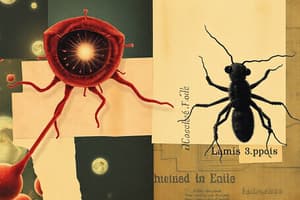Podcast
Questions and Answers
What are zoonoses?
What are zoonoses?
- Diseases of non-human animals that may be transmitted to man (correct)
- Diseases only found in humans
- Diseases caused by bacteria
- Diseases that do not affect animals
What is histology?
What is histology?
A branch of anatomy that deals with the minute structure of animal and plant tissues as discernible with the microscope.
What is microbiology?
What is microbiology?
A branch of biology dealing with microscopic forms of life.
What does cytology study?
What does cytology study?
What are ova?
What are ova?
What is centrifugation?
What is centrifugation?
What is euthanasia?
What is euthanasia?
What does empathy involve?
What does empathy involve?
What is a contaminant?
What is a contaminant?
What is anemia?
What is anemia?
What are bacteria?
What are bacteria?
What does benign mean?
What does benign mean?
What is a biohazard?
What is a biohazard?
What is an electrocardiogram?
What is an electrocardiogram?
What does fecal matter refer to?
What does fecal matter refer to?
What is glucose?
What is glucose?
What is hematocrit?
What is hematocrit?
What is a microscope used for?
What is a microscope used for?
What is a necropsy?
What is a necropsy?
What is a parasite?
What is a parasite?
What does PCV stand for?
What does PCV stand for?
What is rabies?
What is rabies?
What is a roundworm?
What is a roundworm?
What are tapeworms?
What are tapeworms?
What is urinalysis?
What is urinalysis?
What are vaccinations?
What are vaccinations?
Animal body parts removed during surgery should be disposed of quickly in the nearest trash can.
Animal body parts removed during surgery should be disposed of quickly in the nearest trash can.
You should always wear gloves when handling ...
You should always wear gloves when handling ...
Flashcards are hidden until you start studying
Study Notes
Zoonoses
- Diseases from non-human animals that can be transmitted to humans or vice versa.
Histology
- Study of microscopic structure in animal and plant tissues.
Microbiology
- Biological field focusing on microscopic life forms.
Cytology
- Study of cells, including their structure, function, and life history.
Ova
- Term used for the eggs produced by parasites.
Centrifugation
- Method for separating substances based on density using centrifugal force.
Euthanasia
- Practice of ending lives of terminally ill individuals painlessly for mercy.
Empathy
- Understanding and sharing the feelings and experiences of others.
Contaminant
- Any substance that renders a material unusable for its intended purpose.
Anemia
- Condition characterized by reduced red blood cell count or hemoglobin levels.
Bacteria
- Microscopic, single-celled organisms that reproduce by cell division.
Benign
- Non-cancerous; favorable prognosis for recovery.
Biohazard
- Biological agents that pose a risk to health or life.
Electrocardiogram (ECG/EKG)
- Recording of heart's electrical activity generated by small impulses.
Fecal
- Referring to waste matter from intestines; also used for testing for parasites.
Glucose
- Monosaccharide that serves as a key energy source for living organisms.
Hematocrit
- Measures the volume percentage of red blood cells in blood; determined via centrifugation.
Microscope
- Instrument for magnifying small objects to reveal structural details.
Necropsy
- Postmortem examination of animals to determine cause of death.
Parasite
- Organism that lives on or in another, deriving advantages at the host's expense.
PCV (Packed-Cell Volume)
- Percentage of blood volume occupied by packed red blood cells.
Rabies
- Serious viral infection affecting the central nervous system; significant zoonotic disease.
Roundworm
- Parasitic nematode that primarily invades the intestinal tract but can affect other organs.
Tapeworms
- Parasitic infections caused by flat, elongated members of the class Cestoda.
Urinalysis
- Diagnostic test analyzing urine for abnormal substances signaling disease.
Vaccinations
- Process of introducing substances to stimulate immunity against specific diseases.
Studying That Suits You
Use AI to generate personalized quizzes and flashcards to suit your learning preferences.





